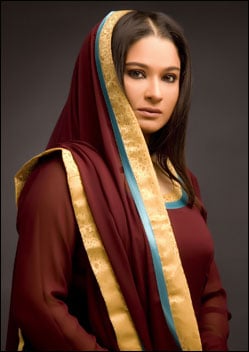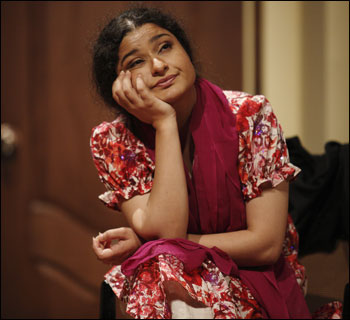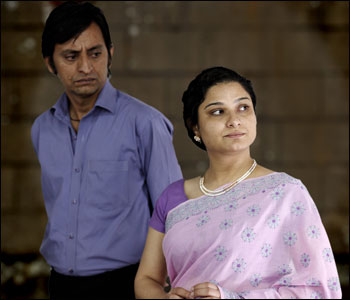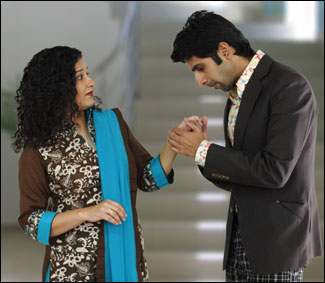|  They
say once you catch the acting bug, it's difficult to shake it off.
I remember watching actress Judy Garland's movies as a child, enjoying
her multiple singing-dancing-acting performances. However, Judy
faced many ups and downs before she finally became a sensation in
1940's Hollywood. In the fledgling days of her career, she was ubiquitously
labeled an 'ugly duckling' and 'hunchback'. Plagued with insecurities
regarding her weight and appearance, she resorted to using weight-reducing
medication and drugs. In her late teens, Judy finally began to gain
recognition as a star. Judy Garland went on to perform in some of
Hollywood's most popular movies like The Wizard Of Oz, Meet Me In
St. Louis and Summer Stock. Though she eventually died due to extensive
use of drugs, Judy Garland is still one of Hollywood's best recognized
vaudevillian actresses. An unhappy life in return for a successful
career - there really is no business like show business. They
say once you catch the acting bug, it's difficult to shake it off.
I remember watching actress Judy Garland's movies as a child, enjoying
her multiple singing-dancing-acting performances. However, Judy
faced many ups and downs before she finally became a sensation in
1940's Hollywood. In the fledgling days of her career, she was ubiquitously
labeled an 'ugly duckling' and 'hunchback'. Plagued with insecurities
regarding her weight and appearance, she resorted to using weight-reducing
medication and drugs. In her late teens, Judy finally began to gain
recognition as a star. Judy Garland went on to perform in some of
Hollywood's most popular movies like The Wizard Of Oz, Meet Me In
St. Louis and Summer Stock. Though she eventually died due to extensive
use of drugs, Judy Garland is still one of Hollywood's best recognized
vaudevillian actresses. An unhappy life in return for a successful
career - there really is no business like show business.
Perhaps that's what separates the great actors from the so-so ones.
Come what may, in sickness and in health, they really can't do anything
else but act. The money may not be great and the fame may come late,
but the true-blue natural born actors have a constant, almost obsessive,
need to keep performing. The thrill of standing before an audience
surpasses everything - money, health, even family.
I meet up with Sania Saeed with some amount of trepidation. I know
she's one of the great 'uns - I've seen some of her plays and the
woman has the capability of giving you goose bumps just through
a single facial expression. She has the unique talent of actually
becoming the character she is enacting; her own personality ceases
to exist. I wonder if she's just as intense and compelling in person.
After all, this is a woman who majored in Psychology but, since
she hailed from a family of thespians and had been acting since
she was 10, didn't know what to do with her life except act.
This is the consummate actress who was given only four days to practice
the dances for her spectacular drama Jhumka Jaan and, as a result,
danced for hours on end and eventually fainted from exhaustion.
She is the theatre aficionado who, in her latest theatrical venture,
is taking part in three different plays in the span of 10 days and
rehearsing for all three everyday.
Actually,
Sania turns out to be pretty normal though she is avid about her
acting. Sitting next to me while taking a break from her consecutive,
exhausting rehearsals, she looks at the mosquitoes swarming over
her head and fishes out mosquito repellant lotion from her purse.
Slathering it onto her arms, she says, "I can't afford to be
sick with the festival just about to begin. There's no excuse for
missing out on a performance - except death!"
 Through
the course of her career, Sania Saeed has been likened to Indian
actresses like Shabana Aazmi and Smita Patel but I beg to differ.
Sania Saeed is talented enough and has worked hard enough to be
credited with a style and niche of her very own. A play starring
Sania Saeed is indubitably going to be very well-presented and riveting.
She is best remembered on television for her roles in Sitara Aur
Mehrunnissa and Jhumka Jaan and her contributions to theatre have
been just as significant. Her father founded the theatrical group
Katha which was later spearheaded by Sania and writer/director Shahid
Shafaat. Weathering Pakistan's many political regimes and varying
censorship indictments, Sania has persevered in her endeavors with
Katha. "There was a time when we performed for tickets worth
Rs 33 per person, just to get people to come," she remembers. Through
the course of her career, Sania Saeed has been likened to Indian
actresses like Shabana Aazmi and Smita Patel but I beg to differ.
Sania Saeed is talented enough and has worked hard enough to be
credited with a style and niche of her very own. A play starring
Sania Saeed is indubitably going to be very well-presented and riveting.
She is best remembered on television for her roles in Sitara Aur
Mehrunnissa and Jhumka Jaan and her contributions to theatre have
been just as significant. Her father founded the theatrical group
Katha which was later spearheaded by Sania and writer/director Shahid
Shafaat. Weathering Pakistan's many political regimes and varying
censorship indictments, Sania has persevered in her endeavors with
Katha. "There was a time when we performed for tickets worth
Rs 33 per person, just to get people to come," she remembers.
Katha's cast and crew are no longer working for a pittance, though.
Four years ago, the group disbanded due to lack of finances. Last
year, they were revived with the aid of the Rotary Club and since
then, they have staged three successful performances.
Still, according to Sania, the remuneration for working in theatre
is about one-fourth that of working on television.
"Even
when I am working on television, a lot of times I am not earning
as much as someone may earn from a regular day-job," she surmises.
"People come to me and say, 'How do you manage to devote yourself
to a job that doesn't pay enough?' As far as I am concerned, it's
a matter of priority. I am the sort of person who'd rather do something
she loves instead of a job that she doesn't enjoy but pays well."
I ask her whether she has ever had to take on unappealing acting
assignments just in order to pay the bills at home to which she
replies, "Luckily, I am not the sole breadwinner in my family.
Everyone at my home earns so I have the support to do whatever work
I please and be choosy with my roles."
And she has been choosy. Sania has a predilection for choosing meaty,
meaningful roles. Her characters are usually serious, with multiple
gray areas and plenty of emotional turmoil thrown into their lives
for good measure.
 I
ask her why she has never opted to do more frivolous roles to which
she immediately replies, "I have done some silly roles, it's
just that I am most remembered for my more serious performances.
I don't intentionally look out for meaningful roles but I do gravitate
towards characters that interest me. If I am passionate about a
role, it is easier for me to act it out." I
ask her why she has never opted to do more frivolous roles to which
she immediately replies, "I have done some silly roles, it's
just that I am most remembered for my more serious performances.
I don't intentionally look out for meaningful roles but I do gravitate
towards characters that interest me. If I am passionate about a
role, it is easier for me to act it out."
"For instance," she continues, "there was a time
about a year ago, when a plethora of teleplays came along with overtly
made-up heroines and saas-bahu storylines, along the lines of Indian
dramas. I just can't see myself doing that sort of character. The
girls who acted in these plays enjoyed carrying off those looks
but I would never be able to enjoy it. I'd rather be appreciated
for what I am than spend hours working on a look that people may
or may not like. Besides, everybody has their own concept of glamour."
Sania elaborates, "In Sitara Aur Meherunnissa, Sitara was,
script-wise, the more glamorous one but I was in college at the
time and I saw more girls following Meherunnissa's dress sense,
wearing loose kurtas and ajraks. So glamour differs from person
to person."
Opting for her personal sense of 'glamour', Sania played the title
role of a dancer in the drama serial Jhumka Jaan last year. Though
the play won accolades and Sania herself was awarded a Lux Style
Award for her acting, she isn't personally satisfied with her work
in the play.
"I could have danced a lot better if I had been given more
time to rehearse," she says. "I love dancing but I don't
have any proper training in it. I was given four days to have the
dances down pat and though I practiced endlessly, I don't think
it was enough. This was the first time the entire team was dealing
with the subject of dance. We learnt a lot of things during the
shooting and even only managed to finalize a choreographer at the
very last minute. I did know the role of Jhumka Jaan completely,
though. A description of her was given to me even before I got the
script and I felt that I utterly understood her."
For Sania, it is very important that she 'understands' the character
she is playing. "I can't do justice to a role if I can't empathize
with the character," she altruistically declares. "Like
in one of the plays in which I am presently acting, I just couldn't
get inside the head of my character and it was irritating and exhausting.
But that's the beauty of having a good team working with you; their
energy helps you in your own work. That's why I like working with
newcomers. They are bursting with creative ideas, are very helpful
and their enthusiasm is infectious."
To this effect, Sania has been part of many directors' debut ventures,
including Ayeshah Alam, Imran Patel, Kanwal Khoosat and Mehreen
Jabbar's first projects. Her secret, she says, is that she makes
sure that she is on the same wavelength as her director.
While television may have won her awards, fame and financial stability,
Sania has always had a penchant for theatre. She began her career
with the stage when she was 10 years old and her theatrical performances
continue to raise the benchmark for good Urdu theatre in Pakistan.
Katha has played a major role in popularizing theatre in Pakistan,
from acting out street theatre for the masses to performing to packed
houses in theatre festivals. Like Sania, almost all the performers
in Katha, have other, more lucrative commitments. Yet, they remain
faithful to their love for theatre.
"Just today, the director of this theatre festival was bitten
by a chameleon and hospitalized. He is back now, rehearsing for
one of the plays!" she says.
"We're all very passionate about what we're doing here. There's
a certain thrill to performing on stage, live before an audience.
You initially get struck by stage fright but as the performance
continues, you lose yourself in it and it is so invigorating to
be able to make your audience feel a variety of emotions. They can't
get up and leave or talk on the phone or switch a channel."
 Though
her own brand of theatre is limited to Urdu, Sania appreciates the
work done by others, even if it is in English and catering to a
particular category of people, a la Nida Butt. "So what if
it is just catering to the elite?" she says. "The elite
also need entertainment, don't they? I saw Mamma Mia! and I thought
it was a good production." Though
her own brand of theatre is limited to Urdu, Sania appreciates the
work done by others, even if it is in English and catering to a
particular category of people, a la Nida Butt. "So what if
it is just catering to the elite?" she says. "The elite
also need entertainment, don't they? I saw Mamma Mia! and I thought
it was a good production."
She insists that this is not the time to point fingers at each other.
"As thespians, we all have opinions on whether or not we like
another group's work but right now, we need to stand together as
a community and just continue working on different projects. All
the art forms in Pakistan have to stay united and come to the forefront.
The world is loudly declaring us to be terrorists; we need to show
them that we're not, just as loudly."
Sania has also recently performed in Amritsar and I ask her if she
faced any animosity while she was there? "Not at all,"
she replies. "And it's just not me. Sheema Kirmani and Ajoka
Theatre perform in India all the time and they don't face any trouble
either. India is a very big and diverse country. I feel that most
of the ill-will between India and Pakistan has been created by the
media and is mainly centered around Mumbai. Even at the time of
the Mumbai blasts, a concert with Pakistani musicians was being
successfully staged in Delhi. I handle most of Shafqat Amanat Ali's
correspondence with India and I think Pakistani performers face
more hostility from India's film fraternity than from the locals.
Indian singers lose out financially when songs that could have gone
to them are being sung by Shafqat Amanat Ali or Rahat Fateh Ali
Khan. But since they themselves don't have singers of such caliber,
music directors don't have any option but to hire our singers."
Sania's work with Shafqat Amanat Ali is mostly internet-based.
"I organize his career outside of Pakistan, mainly in India.
Stuff I can easily do from home," she explains. The rest of
her time is spent cavorting between acting on television, stage
and even radio, on which she used to do talk shows.
When I ask her to choose her favorite line of entertainment, she
gets confused. "It depends on who I am working with, how interesting
the project is and whether I am learning something new," she
replies. "For instance, when I was working in radio, there
was this one show I did with actor Qazi Wajid. He began to speak
and the entire atmosphere became charged. I was in awe, I never
knew you could emote so much just through your voice!"
And do financial considerations come into play when she is choosing
a project? Immediately, she shoots back, "No, the project should
just interest me. If I like a beautiful wristwatch that can only
be purchased by doing a humdrum but lucrative job, I'd forego the
watch immediately. I'd rather be doing something I am passionate
about."
And passionate she certainly is. As the sun sets over Karachi's
Arts Council, Sania Saeed returns to her rehearsals. She has been
practicing since eight in the morning and is exhausted. Yet, she
is happy doing something she loves.
One of Pakistan's few bona fide actresses, she'd rather choose roles
she likes than opt for projects that pay well, she'd rather work
for days on end for a theatre festival that excites her though she'll
be paid a relatively meager salary with the remaining proceeds going
on to charity. It's rare in this day and age to find someone as
sincere, talented, and unconcerned about money as Sania Saeed. Perhaps
that's the beauty of being an actor, to be doing something you enjoy
so much everything else becomes secondary. Like I said, there really
is no business like show business.
|

